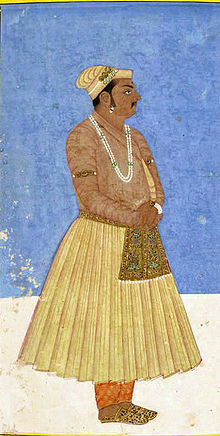Raja Bir Bar
| Birbal | |
|---|---|

Birbal
|
|
| Born | Mahesh Das 1528 present-day Uttar Pradesh, India |
| Died | 1586 (aged 57–58) Swat valley, present-day Pakistan |
| Occupation | Courtier and advisor in the Mughal court of Emperor Akbar |
Birbal IPA: [biːrbəl] (born Mahesh Das; 1528–1586), or Raja Birbal, was a Hindu Brahmin advisor in the court of the Mughal Emperor Akbar. He is mostly known in the Indian subcontinent for the folk tales which focus on his wit. Birbal was appointed by Emperor Akbar as a poet and singer in around 1556–1562. He had a close association with the Emperor, being part of his group of most important courtiers called the navaratna or nine jewels. In 1586, Birbal led an army to crush an unrest in the north-west Indian subcontinent, which failed when he was killed along with many troops, in an ambush by the rebel tribe. Despite many folk tales to the contrary, no historical evidence attests that Birbal influenced Akbar by his witticisms.
By the end of Akbar's reign, local folk tales emerged involving his interactions with Akbar, portraying him as being extremely clever and witty. As the tales gained popularity in India, he became even more of a legendary figure across India and neighbouring countries surrounding it. These tales involve him outsmarting rival courtiers and sometimes even Akbar, using only his intelligence and cunning, often with giving witty and humorous responses and impressing Akbar. By the twentieth century onwards, plays, films and books based on these folk tales were made, some of these are in children's comics and school textbooks. He was the only Hindu to adopt Din-i Ilahi, the religion founded by Akbar.
Birbal was born as Mahesh Das in 1528, in a village near Kalpi, present-day Uttar Pradesh, India; according to folklore, it was at Tikawanpur near the banks of river Yamuna. His father was Ganga Das and mother, Anabha Davito. He was the third son of a Hindu Brahmin family which had a previous association with poetry and literature.
Educated in Hindi, Sanskrit and Persian, Birbal wrote prose, specialised in music and poetry in the Braj language, thus gaining fame. He served at the Rajput court of Raja Ram Chandra of Rewa (Madhya Pradesh), under the name "Brahma Kavi". Birbal's economic and social status improved when he married the daughter of a respected and rich family, contrary to the notion that he was on poor economic terms before his appointment at Mughal Emperor Akbar's imperial court.
...
Wikipedia
